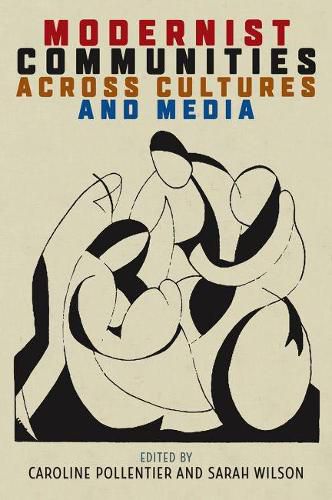Readings Newsletter
Become a Readings Member to make your shopping experience even easier.
Sign in or sign up for free!
You’re not far away from qualifying for FREE standard shipping within Australia
You’ve qualified for FREE standard shipping within Australia
The cart is loading…






This title is printed to order. This book may have been self-published. If so, we cannot guarantee the quality of the content. In the main most books will have gone through the editing process however some may not. We therefore suggest that you be aware of this before ordering this book. If in doubt check either the author or publisher’s details as we are unable to accept any returns unless they are faulty. Please contact us if you have any questions.
Marked by a rejection of traditional affiliations such as nation, family, and religion, modernism is often thought to privilege the individual over the community. The contributors to this volume question this assumption, uncovering the communal impulses of the modernist period across genres, cultures, and media.
Contributors show how modernist artists and intellectuals reconfigured relations between the individual and the collective. They examine Dada art practices that involve games and play; shared reactions to the post-World War I rhetoric of Woodrow Wilson; the reception of James Joyce’s Ulysses in Harlem Renaissance circles; the publishing platform of the Bengali literary review Parichay; popular radio shows and news broadcasts; and the universal aspects of film viewing. They also explore radical reimaginings of community as seen in the collective cohabiting envisioned by Virginia Woolf, the utopian experiment of Black Mountain College, and the communal autobiographies of Gertrude Stein.
The essays demonstrate that these pluralist ecosystems based on participation were open to paradox, dissent, and multiple perspectives. Through a transnational and transmedial lens, this volume argues that the modernist period was a breakthrough in a rethinking of community that continues in the postmodern era.
$9.00 standard shipping within Australia
FREE standard shipping within Australia for orders over $100.00
Express & International shipping calculated at checkout
This title is printed to order. This book may have been self-published. If so, we cannot guarantee the quality of the content. In the main most books will have gone through the editing process however some may not. We therefore suggest that you be aware of this before ordering this book. If in doubt check either the author or publisher’s details as we are unable to accept any returns unless they are faulty. Please contact us if you have any questions.
Marked by a rejection of traditional affiliations such as nation, family, and religion, modernism is often thought to privilege the individual over the community. The contributors to this volume question this assumption, uncovering the communal impulses of the modernist period across genres, cultures, and media.
Contributors show how modernist artists and intellectuals reconfigured relations between the individual and the collective. They examine Dada art practices that involve games and play; shared reactions to the post-World War I rhetoric of Woodrow Wilson; the reception of James Joyce’s Ulysses in Harlem Renaissance circles; the publishing platform of the Bengali literary review Parichay; popular radio shows and news broadcasts; and the universal aspects of film viewing. They also explore radical reimaginings of community as seen in the collective cohabiting envisioned by Virginia Woolf, the utopian experiment of Black Mountain College, and the communal autobiographies of Gertrude Stein.
The essays demonstrate that these pluralist ecosystems based on participation were open to paradox, dissent, and multiple perspectives. Through a transnational and transmedial lens, this volume argues that the modernist period was a breakthrough in a rethinking of community that continues in the postmodern era.